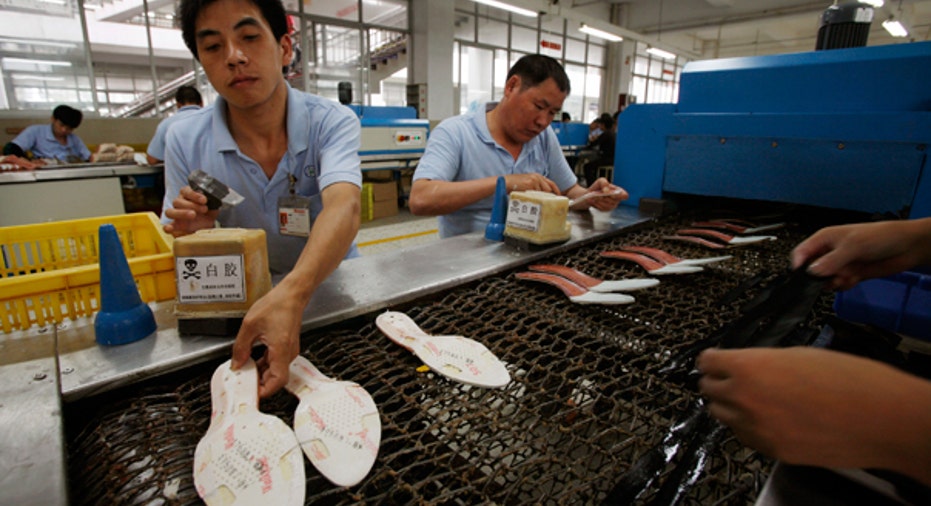China, Euro Manufacturing Slump Continues

Aggressive new policy from the European Central Bank has so far failed to boost ailing euro zone business, according to surveys that showed a widening chasm between sickly France and a more resilient Germany.
Thursday's purchasing managers indexes (PMIs), which survey thousands of companies worldwide every month, also showed Chinese factory activity wilted for an 11th month in September, as Europe's troubles continued to hit Asian exporters.
That looks unlikely to improve soon.
While the downturn in Europe's largest economy, Germany, eased by a surprising amount this month, French firms fell deeper into the mire in September - and at a far faster rate than expected.
A good indicator of economic performance, the composite euro zone PMI fell to 45.9 in September from 46.3 in August.
Below 50 denotes contraction and survey compiler Markit said the surveys were consistent with a roughly 0.6 percent economic contraction in the third quarter.
There was little sign that the ECB's plan to buy the debt of troubled euro zone states, announced on Sept. 6, has boosted confidence among service sector firms - at least so far.
"The fall in the PMI is another reminder that the ECB's new asset purchase programme is not an answer to all of the region's problems," said Ben May, European economist at Capital Economics, in a research note.
"The euro zone recession looks set to deepen in the latter part of the year."
European shares fell on Thursday after the data, which pushed the euro further away from last week's 4-1/2-month high, hitting a low of $1.294.
While euro zone manufacturers performed slightly better than economists hoped this month, the downturn in the dominant services industry intensified sharply.
The euro zone services PMI fell to 46.0 in September from 47.2 in August, below even the most pessimistic forecast of 46.5 in a Reuters poll of nearly 40 economists.
The surveys backed the growing view that the ECB will cut its main interest rate at its next meeting in October, to a new record low 0.5 percent from 0.75 percent currently.
"Further macroeconomic stimulus - including a weaker euro and an ECB rate cut - is likely to be needed to put the region on a path of sustained growth and hence ensure the survival of (the euro zone)," said Martin van Vliet, economist at ING.
The final PMIs for September, which include the individual data surveys for smaller euro zone economies and Britain, are released at the start of October.
FAUX PAS IN FRANCE
France represented by far the biggest disappointment of Thursday's PMIs, as both its manufacturing and services PMIs fell beneath the lowest forecasts from 20 economists.
"The sharp decline is somehow surprising as industrial production held up relatively well over the summer and we expected the positive news flow on the development of the euro zone crisis to be supportive in September," said Annalisa Piazza, economist at NewEdge Strategy.
Conversely, both the manufacturing and service sector PMIs for Germany came in above the cheeriest prediction from a sample of nearly 30 economists.
"Whether or not that will last is the big question. We're not altogether hopeful about that," said Chris Williamson, chief economist at PMI compiler Markit.
In Britain, suffering its own economic slump, retail sales ticked down in August driven by a slump in online sales as Britons watched the Olympics on television, data showed on Thursday.
The huge economic uncertainty in Europe has had a pronounced impact on export-reliant economies like China, where manufacturing contracted again in September.
European Union and Chinese leaders are meeting in Brussels on Thursday leaders to try to bridge growing differences over trade and find common ground on tackling Europe's debt crisis.
The China manufacturing PMI inched up in September to 47.8 from August's nine-month low of 47.6, suggesting the world's second-largest economy remains on track for a seventh quarter of slowing annual growth.
"In order to convert hopes into reality and avoid an outright hard landing, the Chinese authorities have to step up again their accommodative efforts on both the fiscal and the monetary side," said Nikolaus Keis, economist at UniCredit.
China's economic slowdown is expected to reach its nadir this quarter, with a recovery of momentum delayed until the final quarter, leaving growth for 2012 likely to fall below 8 percent, a level unseen since 1999, a Reuters poll showed last week.



















